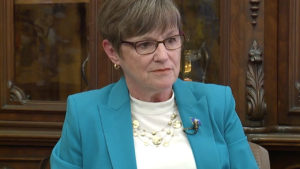Legal experts refute gender privacy claims by ACLU, KNEA on parental notification
(The Sentinel) – The Kansas chapter of the American Civil Liberties Union (ACLU) and the Kansas chapter of the National Education Association (KNEA) seem once again to be giving school districts…

(The Sentinel) – The Kansas chapter of the American Civil Liberties Union (ACLU) and the Kansas chapter of the National Education Association (KNEA) seem once again to be giving school districts bad legal advice.
This time, they are telling school districts they do not have to inform parents about their child’s desire to begin “social transitioning” to a different gender, and multiple legal experts say the ACLU and KNEA are wrong to do so.
Private, pro-bono public interest law firms, the Wisconsin Institute for Law and Liberty and Alliance Defending Freedom, won a case in October of last year in which the judge — Waukesha County Circuit Court Judge Michael P. Maxwell — ruled that even a so-called “social transition” is a “‘powerful psychotherapeutic intervention,” and therefore a medical issue, over which parents have control — not the school district. While it was a state case, the judge noted U.S. constitutional rights apply.
ACLU and KNEA insist this is a “privacy” and Title IX issue, but again, legal experts disagree.
The background
In late 2023, Kansas Attorney General Kris Kobach sent letters to six Kansas school districts, challenging their policies that require or allow school district staff to conceal from parents a student’s “transgender” or “gender non-conforming” status.
“A child changing his or her gender identity has major long-term medical and psychological ramifications,” Kobach said in the release. “Parents should know, and have an opportunity to be involved in, such an important aspect of their well-being.”
According to Kobach’s office USD 357 Belle Plaine and USD 266 Maize responded to the letter stating they had immediately rescinded or amended their policies.
However, USD 500 Kansas City, USD 233 Olathe, USD 512 Shawnee Mission, and USD 501 Topeka declined to make changes.
ACLU’s response contrary to the premise of constitutional rights
Earlier this month, the ACLU sent out a release stating: “Notably absent from Attorney General Kobach’s letter to school districts about their policies protecting transgender students is a meaningful legal analysis, so we are glad to provide one. Students have a constitutional right to privacy with respect to information about their sexual orientation or gender identity. It is unlawful for school officials to disclose that information. Forced outing of transgender students likely violates federal privacy laws in addition to students’ constitutional privacy rights. Denying students the right to use the name and pronouns that affirm their gender identity likely violates Title IX of the Educational Amendments of 1972 and the Equal Protection Clause of the United States Constitution.”
However, the Wisconsin court found that Title IX simply is not implicated under this issue and noted that, moreover, the letter the ACLU and others rely on to claim Title IX protections for “transgender” students has since been rescinded and that least one federal appeals court has said Title IX does not cover gender identity.
Then, on Wednesday, February 22, 2024, the ACLU also sent letters to school districts, stating: “We felt it prudent to send this advisory letter clarifying that Kansas does not have a law requiring school districts to out students to their parents or guardians, and it is not illegal for school districts to adopt policies that address such situations on a case-by-case basis with consideration for the student’s privacy and safety.” (emp. in original)
Brittany Jones, an attorney with Kansas Family Voice, said the ACLU and KNEA are deliberately misleading schools.
“The ACLU & KNEA seem intent on misrepresenting Federal statutes & the scope of case law on parental rights,” she said. “The majority of courts which have considered this question have protected the parent-child relationship and the right of parents to be informed of these important decisions pertaining to their child. The school system does not have the right to make such intimate decisions about a child who is only temporarily in their care for a limited number of hours a day. Parents have the fundamental right to raise their own children not the school system.”
Moreover, despite the ACLU’s claims to the contrary, students do not have a constitutional right to privacy regarding sexual orientation or “gender identity.”
WILL Deputy Council Luke Berg, one of the attorneys on the Wisconsin lawsuit, said in an interview with the Sentinel he hears the privacy argument often.
“There is no court that I’m aware of that has accepted a privacy right vis a vis the parents,” He said. “That’s what you have to understand. Minors do have some privacy rights, but not against their parents.
“Which is why state and federal law give parents full access to their own children’s medical records, education records. So, you know, I think that argument is one of the worst ones, but you know, you hear it often.”
Kobach refutes allegations by the Wichita Eagle
In a column in the Wichita Eagle — itself a response to a column by Dion Lefler calling for Kobach’s impeachment — Kobach noted that while there is no specific law in Kansas requiring parents to be informed of a child’s “social transition,” the United States Supreme Court has, no less than nine times affirmed the constitutional right of parents to “bring up children.”
Kobach also noted that a state statute must not be passed before a constitutional right can be enforced.
“For example, there is no state statute enacted by the Legislature that protects all aspects of the First Amendment,” Kobach wrote. “But every First Amendment right is still enforceable in Kansas courts.”
More to the point, as Kobach notes, the U.S. District Court for the State of Kansas enjoined USD 475 from disciplining a teacher who discloses a student’s “preferred pronouns” to parents.
“In Ricard v. USD 457 Geary County School Board,” Kobach wrote, “the court held that ‘it is illegitimate to conceal information from parents for the purpose of frustrating their ability to exercise [their] fundamental right’ to direct the education and upbringing of their child.”
While the Wisconsin case is not binding on Kansas, judges in other states are able to take notice of the findings.
“We hope that other courts will look at it as persuasive,” Berg said. “The reasoning that the court applied … would apply in every state in every school district around the country because parental rights are a federal constitutional right that the Supreme Court has long recognized.”



